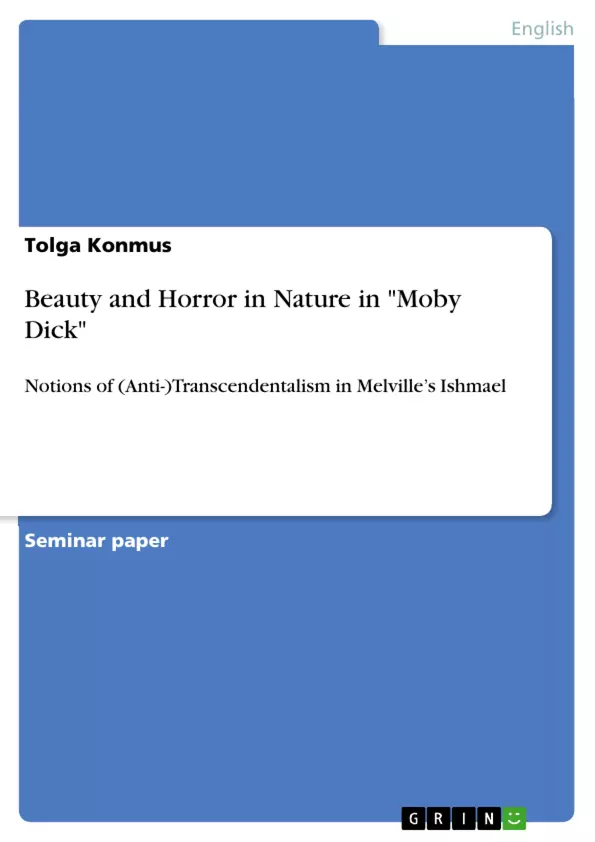In this paper I want to focus on the main character and narrator of the book "Moby Dick", especially on his reported thoughts and impressions on Transcendentalist key aspects go get to the bottom of whether there is a clear inclination towards or away from Transcendentalist ideas.
When Herman Melville had written and released "Moby Dick" in 1851, Transcendentalism reached its peak in the United States. It is safe to say that Melville had not been totally isolated from the effect of this new movement and had formed an opinion on it. In spite of the temporal simultaneity, "when he wrote Moby-Dick Melville had not read Emerson. He had merely attended one of his lectures." Nevertheless, this one lecture gave him enough incentive to write a letter to Evert Duykinck nineteen days after the lecture, telling him about he felt about Emerson. In this letter, Melville "rejects the notion that he might be a follower of the Transcendentalist camp", but finds him a peculiar man nevertheless: "there is a something about every man elevated above mediocrity, which is, for the most part, instinctualy perceptible. This I see in Mr. Emerson".
In a pictorial description, Melville thinks Emerson capable of deeper thought and compares him to a whale descending great depths, acknowledging his skills, in contrast to other fish which are only able to swim closely to the surface. Hoffmann says that "Melville admires the figure Emerson cuts, not the word he utters” which is a pretty ambivalent statement to give. Melville also mentions in his letter a "gaping flaw" he had seen in Emerson. According to Hoffmann, Melville was bothered by the "high presumptuousness" Emerson displayed, "a feeling that had he been around when the world was created he could have given God some good advice-perhaps even taken His place". It is hard to say whether Melville was really fond of Emerson’s ideas or not. According to Romero, we get an impression of "simultaneous embrace and rejection of Transcendentalist ideas" and Hoffmann also diagnosed a similar behavior of Melville, in which Melville argues that some ideas of Emerson are flawed but at the same time utilizes Transcendentalist ideas in his book Moby-Dick.
Table of Contents
- Introduction
- Transcendentalism
- Introduction
- Pull to Nature
- The Beauty of Nature and the Leviathan
- The Tail of the Leviathan
- Transcendentalism and Art
- The Painting in the Spouter-Inn
- Conclusion
Objectives and Key Themes
This paper examines Herman Melville's *Moby-Dick* through the lens of Transcendentalism, a philosophical movement that emerged in the United States during the 19th century. The primary objective is to explore the relationship between the novel's protagonist, Ishmael, and the core tenets of Transcendentalism, specifically focusing on his perceptions of nature, beauty, and the inherent goodness of the universe.
- Transcendentalism's impact on 19th-century American literature
- The relationship between nature and human experience
- The role of beauty and horror in nature
- The concept of the sublime in Melville's work
- The interplay between subjective perception and objective reality
Chapter Summaries
The introduction sets the stage for the analysis by providing context on the rise of Transcendentalism in the United States and Melville's relationship with the movement. The chapter focuses on the evolution of Transcendentalist ideas, particularly Emerson's influence, and how Melville, despite his reservations about Emerson, embraced certain aspects of Transcendentalism in his writing.
The second chapter dives into the core concept of nature's pull in Transcendentalism. It explores how Transcendentalists viewed nature as a source of beauty and inspiration, urging individuals to seek solace and renewal in the wilderness. The chapter analyzes Ishmael's initial experiences in the novel, highlighting his yearning for escape from the confines of urban life and his desire to connect with the natural world.
The third chapter examines the contrasting perspectives on nature as both beautiful and terrifying, as depicted in Melville's work. The chapter delves into the concept of the Leviathan, a monstrous creature that embodies both the grandeur and the destructive power of the natural world.
Keywords
Key concepts explored in this paper include Transcendentalism, nature, beauty, horror, the sublime, the Leviathan, human perception, and the relationship between art and nature.
Frequently Asked Questions
What is the relationship between Herman Melville and Transcendentalism?
Melville had an ambivalent relationship with Transcendentalism; while he admired Emerson's depth, he also criticized the movement's "high presumptuousness."
How is nature depicted in Moby Dick?
Nature is presented as a duality of sublime beauty and terrifying horror, embodied by the sea and the whale itself.
What does the Leviathan represent in the novel?
The Leviathan (Moby Dick) represents the uncontrollable and destructive power of the natural world that challenges human perception and survival.
Is Ishmael a Transcendentalist character?
Ishmael displays Transcendentalist tendencies, such as his pull to nature and spiritual seeking, but the novel also explores the limits of these ideas when faced with the reality of nature's horror.
What is the role of art in the context of Transcendentalism in the book?
The paper analyzes how art, such as the painting in the Spouter-Inn, reflects the interplay between subjective interpretation and the objective reality of nature.
- Quote paper
- Tolga Konmus (Author), 2018, Beauty and Horror in Nature in "Moby Dick", Munich, GRIN Verlag, https://www.grin.com/document/471363



